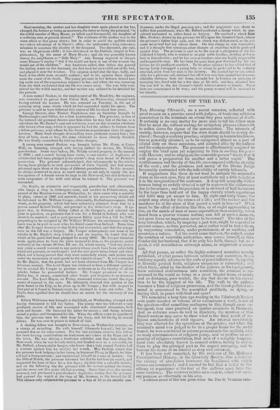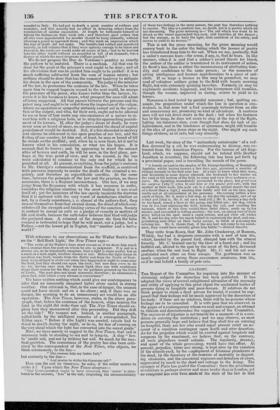TOPICS OF THE DAY.
If suggestions like these do not tend to mitigate the criminal's doom in his own eyes, they at least contribute not a little to lighten it in the imagination of the audience. A deep-felt sympatliy with a human being so awfully situated is apt to supersede the abhorrence due to his crimes ; and his punishment is divested of half its terrors by the hope thus held out of the happy eternity which repentance and faith may yet assure to him. In eight-and-forty-hours the culprit may atone for the crimes of a life ; and the robber and the murderer be at the close of that period a saint in heaven ! What must be the effect of doctrine like this, or of aught approaching to this, on the minds of men of more superstition than morality, when heard from a quarter whence nothing can fall at such a moment, but must leave an impression never to be erased? The idea of' the long hereafter, which, by inspiring a just fear, might be expected to prevent crimes, as thus perverted, must rather tend to foster them, by suggesting consolation, under punishment, of so soothing and sovereign a nature. Let the worst come that call, the culprit, under the sanction of venerable authorities, may assure himself, as Mrs. Corder did her husband, that if he only has faith, though but as a grain, it will nevertheless outweigh crime, in magnitude a moun- tain.
' All that passes, or rather the highly-coloured narrative usually published, of what passes between sentence and execution, has a tendency equally adverse to the ends of penal inflictions. Sympat hy is liberally poured forth, religious eloquence is exhausted ; and when these, aided by the shadow of the gallows in the background, have subdued stubbornness into contrition, the criminal is an- nounced to the world as being in a most blissful frame of mind ; and as declaring, poor wretch, the day that dawns on his execu- tion to be the happiest of his life. The walk to the gallows becomes a kind of religious procession, and the blood-polluted cri- minal is announced to the assembled multitude, as dying, or having died, in peace with God and man ! We remember a long time ago reading in the Edinburgh Review —to quote number or volume of so voluminous a work, is out of the question—that something analogous to this, though snore ex- travagant, was once practised on similar occasions in Denmark. Ancl as extreme cases du well to illustrate, the mention of this Danish custom may serve to show what is the final result of re- ligious ameliorations of civil rigours. An interval inordinately long was allowed for the operations of the priests ; and when the criminal's mind was judged to be in a proper frame for the awful transit, he was conducted in solemn procession to the scaffold, with so many circumstances of religious pomp, and so profuse an out- pouring of religious consolation, that men of a seraphic tempera- ment were absolutely known to commit crimes, merely to enahle them to play the principal part in the august ceremony, and to become the cause of an interest so deep and universal.
It has been well remarked, by the reviewer of Mr. Halkan's Constitutional History, in the Qum terly Review, that a belief in
the efficacy of absolution increases the hardihood with which crimes are committed ; and it cannot be but that a belief in the efficacy of repentance at the foot of the gallows must he .‘ ;'• same tendency. The reviewer relates an anecdote, which V:11i our purpose as effectually as his own. "A curious proof of this was given when the Due de Iv-tali:Lome cons- manded in Italy. He had put to death a great number of robbers and assassins, and this severity had no effect in deterring others from the commission of similar enormities. At length he bethought himself of taking the Italians on their, weak side ; and therefore gave orders that all who were apprehended for murder should be hung instantly, without allowing a priest to approach them ; and this made an impression which the fear of death did not make. The bandits had robbed and murdered merrily, in full reliance that if they were uplucky enough to be taken and executed, the confessor would make all secure at last,—but to be hurried into the other world without an acquittal in full of all demands, was a danger at which the most desperate ruffians quailed."
We do not propose the Due de Vendome's practice as exactly the pattern to be imitated. There is a medium. All that can be done for the good of the prisoner's soul ought to be done ; and all the alleviation that can be yielded him ought to be yielded : it is so much suffering subtracted from the sum of human misery ; but nothing should be done that has the remotest tendency to mitigate his doom in the eyes of the community. The judge is the minister of the law, to pronounce the sentence of the law. When he takes upon him to suggest hopes in regard to the next world, he usurps the province of the priest, who knows better than the lawyer, be- cause it is his business to know, what prospect the case will admit of being suggested. All that passes between the prisoner and the priest may and ought to be veiled from the inspection of the vulgar, whose co-operation or sympathy certainly cannot aid in the salva- tion of the culprit, and who, for their own, ought not to be allowed to see or hear of him under any circumstances of a nature to -in- vest him with a religious halo, or to strip his approaching punish- ment of its terrors. If, after the judge's doom of death, he were never seen or heard of more, we are persuaded the dread of capital punishment would be doubled. But, if a fate shrouded in mystery and silence be abhorrent to the open practice of our law, and the feeling of our country, let him not, at least, be seen or heard of till he stands on the scaffold ; and, when he is seen there, let it not be known what is his consolation, or what are his hopes. It is enough that lie knows ; and, by appearing to stand the outcast alike of heaven and earth, he will be seen, in the first place, per- haps in the true point of view, and in the second, in the one most calculated to conduce to the only end for which he is punished at all. At present, everything, from the judge's sentence to Mr. Orridge's communication from the scaffold, is contrived with perverse ingenuity to render the death of the criminal a nu- gatory, and therefore an unjustifiable sacrifice. At the same time, between the principle of the law and the practice, on these occasions, there is a flagrant inconsistency. Our law, if we may judge from the frequency with which it has recourse to oaths, considers the religious sanction as the most binding it can avail itself of; yet the ministers of the law openly inculcate the doctrine that it is optional with the very worst of malefactors whether or not, by a timely repentance, i. e. almost at the gallows-foot, they rescue themselves from that eternal doom, the dread of which con- stitutes all the strength and binding virtue of the sanction. Society is content to accept an oath as a pledge of veracity in matters of life and death, because the oath-taker believes that God will judge the perjured man. A criminal of far deeper die than the false swearer is instructed to hope that he will meet, not a judge, but a Father, —not the lowest pit in Tophet, but "another and a better world !"



















 Previous page
Previous page